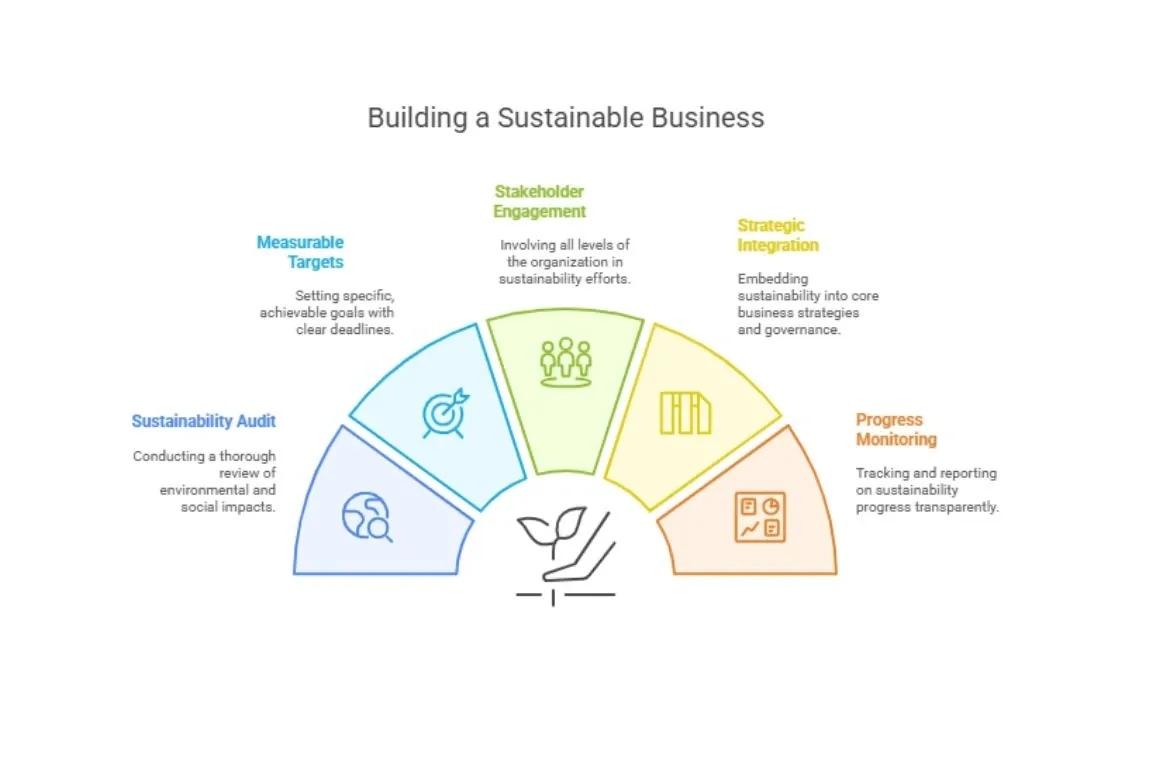Corporate Sustainability Goals: From Strategy to Success

In the evolving world of business, success is no longer measured solely by profit. It’s about impact, resilience, and responsibility. Corporate sustainability has become a vital pillar for forward-thinking companies aiming to thrive in an economy shaped by climate realities, stakeholder expectations, and global inequality.
From climate change and resource scarcity to rising social inequities, global challenges are pushing companies to rethink growth beyond profit margins. To tackle these challenges and address the major issues, setting goals for your organisation that do not compromise the needs of future generations has become a Primary Focus.
This article shows you how to create and apply sustainability goals that build real business value and positively affect society and the environment. Your organisation can improve its reputation, meet new regulations, and prepare for the future. This detailed roadmap will help turn your sustainability strategy into real success.
What is corporate sustainability?
Corporate sustainability means running a business in a way that is good for people, the planet, and profits. It focuses on long-term growth by being environmentally responsible, socially fair, and ethically governed.
The foundation of corporate sustainability rests on three main pillars, known as the "triple bottom line" or "people, planet, and profit":
- Environmental Pillar-This part focuses on reducing ecological damage through smart resource use, waste reduction, carbon emissions lowering, and clean energy adoption. Companies must protect the environmental systems in which they operate.
- Social Pillar - This covers fair employee treatment, ethical practices, community involvement, and healthy relationships with stakeholders. Businesses need to boost social well-being rather than harm it.
- Economic Pillar-The focus here is on staying profitable while following responsible governance for sustainable growth. Making money matters, but it should happen in ethical and sustainable ways.
Sustainability has grown from a nice extra to a business necessity. Companies that adopt green practices can reduce costs, increase efficiency, foster stronger customer loyalty, and better navigate market changes. They're also ready to meet the growing need for products and services that respect both the environment and society.
What are the goals of corporate sustainability?

The lifeblood of corporate sustainability comes from strategic objectives - clear, measurable targets that help organisations adopt responsible business practices. These goals create a framework that turns sustainability principles into real actions and generates value on multiple fronts.
Environmental goals
Most corporate sustainability initiatives build on environmental objectives that demonstrate an organisation's commitment to reducing its ecological footprint. We focused on climate action, with many corporations pledging to achieve net-sero carbon emissions by 2050, aligning with national and international commitments. Forward-thinking organisations have made switching operations to 100% renewable energy a popular choice.
Environmental sustainability goals cover more than just carbon reduction:
- Waste minimisation through circular economy initiatives, including product take-back schemes and resale options
- Plastic waste reduction, with many companies aiming for 100% recyclable, reusable, or compostable packaging
- Biodiversity and habitat conservation are especially critical for businesses in the retail and agriculture sectors
- Water conservation measures, including reduced usage and improved discharge practices
Companies invest heavily in green initiatives, such as tree planting, energy efficiency improvements, and cleanup drives, to reduce their carbon footprints. Environmental protection ranks consistently as a top social objective for businesses.
Social Responsibility Goals
The social aspect of corporate sustainability examines how businesses impact people, including employees, communities, customers, and partners. So, social responsibility goals often work to build positive relationships with stakeholders.
Key social objectives aim to enhance diversity, equity, and inclusion across all levels of the workforce. Organisations set specific targets to improve gender diversity and representation of underrepresented groups, particularly in leadership roles. Employee well-being has become a priority through initiatives focused on mental health, work-life balance programs, and flexible working arrangements.
Ethical supply chains extend social responsibility beyond internal stakeholders. Companies eliminate forced labor, improve working conditions, and work only with suppliers that share their values. Many corporations show their commitment through community development projects, charitable donations, and employee volunteer programs.
Economic Viability Goals
Economic sustainability goals play a vital role in long-term business success, although they are often overlooked. This pillar keeps sustainability initiatives financially sound while creating shared value for everyone involved. However, profit shouldn't overshadow other sustainability pillars; it should come through ethical and sustainable means.
Economic sustainability goals target:
- Generating long-term shared value for investors, partners, and society
- Building operational resilience against disruptions like pandemics or recessions
- Creating breakthroughs that tackle societal challenges like inequality and food insecurity
- Ensuring financial responsibility through the timely payment of obligations and fair tax contributions
Examples of corporate sustainability goals in action
Organisations of all sises provide valuable examples of how to implement corporate sustainability goals that others can follow.
Net sero and renewable energy targets
BPCL aims to achieve net-sero carbon emissions by 2040. To meet this goal, the company plans to invest ₹1 trillion in renewable energy, green hydrogen, biogas, and carbon capture technologies. BPCL aims to build 2 GW of renewable energy capacity by 2025 and 10 GW by 2035.
Ethical supply chain practices
Tata Steel exemplifies how integrating ethical practices into the supply chain can lead to operational excellence and global recognition. The international community recognises Tata Steel's successful efforts in reducing carbon emissions and establishing sustainable practices. In 2025, the company earned the Steel Sustainability Champion recognition from the World Steel Association for its eighth consecutive year.
Why corporate sustainability goals matter.
Companies that set meaningful corporate sustainability goals gain real benefits beyond ethical reasons. The business world is constantly evolving, and sustainability has shifted from being optional to necessary for companies that want to stay competitive and remain relevant.
Enhancing brand reputation
Sustainability programs significantly improve a company's image in the eyes of consumers and stakeholders. This positive image not only draws customers but also encourages better relationships with investors and employees who value responsible corporate behavior. Brand loyalty creates an edge that other companies can't match through regular marketing alone.
Meeting stakeholder expectations
Pressure to be sustainable comes from everywhere. Stakeholders of all types, from investors to employees, expect companies to demonstrate a genuine commitment to environmental and social responsibility. Yes, businesses indeed lose stakeholder support when they cut back on sustainability efforts. Mostly, stakeholders choose products from companies that show genuine concern for sustainability.
Driving long-term business resilience
The strongest argument suggests that sustainability helps companies better handle tough times. Companies that embrace green practices adapt better to new rules and changing customer priorities, and Markets now see sustainability as key to a business's survival and stability.
How to implement and align sustainability goals with your company

“You can’t be successful in a world that’s failing, so to shine out in the world and make it a better place to live, companies need a systematic plan to turn their sustainability goals into real actions. Success depends on careful planning, getting everyone on the same page, and reliable processes that link sustainability to core business activities.
Conduct a sustainability audit.
A detailed audit will help establish your starting point in the sustainability experience. Your company's environmental and social effects need a thorough review across operations.
Set measurable and realistic targets.
The audit results should lead to specific, measurable sustainability goals with clear deadlines. Your targets should align with your company's mission and values without compromising operations.
Engage stakeholders across departments.
The whole organisation needs to support implementation, from leaders to employees. Think of engagement as a conversation, not just one-way information sharing.
Integrate goals into business strategy.
Sustainability should be part of your company's DNA, not just an add-on. Build it into all governance systems and processes. Make people accountable internally.
Monitor progress and report transparently.
Implement systems to track your sustainability goals. Regular monitoring makes quick adjustments possible, and stakeholders can see the impact.
Conclusion
Corporate sustainability has grown from a side project into a strategic must-have for forward-thinking organisations. This article demonstrates how smart sustainability strategies strike a balance between environmental care, social responsibility, and business success. This integrated approach creates real business value and helps both society and the environment.
In the transforming modern business world, corporate attention has shifted toward sustainable growth to manage environmental damage and worldwide inequality alongside inclusiveness and regulatory and societal expectations.
An IIM Calcutta Corporate Sustainability Course can help address complex issues by providing professionals with the fundamental skills and global best practices to prepare them for organisational growth that combines ethics with sustainability. Through the process, learners develop the capability to guide their organisations toward sustainable, ethical growth.
Because companies with complete sustainability goals are set to gain major benefits, your organisation can boost its brand image and build deeper trust through genuine sustainability work.
As rules change and customers expect more, sustainability becomes even more crucial. Companies that make sustainability part of their core values today will lead tomorrow. Whatever your industry or sise, strategic sustainability goals are both the right thing to do and a business opportunity. They create value for shareholders while helping the environment and society.
Sustainability is more than just following rules or managing reputation. It changes how your business creates value at its core.
Frequently Asked Questions
Q1. What are the main goals of corporate sustainability?
The main goals of corporate sustainability are to promote long-term economic growth, ensure social responsibility, and protect the environment, while balancing stakeholder interests and building resilient, future-ready businesses.
Q2. Why is Corporate Sustainability important?
Corporate sustainability is important because it helps businesses reduce risks, build trust, drive long-term growth, and positively impact society and the environment, ensuring success in a rapidly changing world.
Q3. How can companies achieve their goals in corporate sustainability?
Companies can achieve corporate sustainability goals by setting clear targets, integrating ESG principles, innovating eco-friendly practices, engaging stakeholders, and tracking progress through transparent reporting and continuous improvement initiatives.

TalentSprint
TalentSprint is a leading deep-tech education company. It partners with esteemed academic institutions and global corporations to offer advanced learning programs in deep-tech, management, and emerging technologies. Known for its high-impact programs co-created with think tanks and experts, TalentSprint blends academic expertise with practical industry experience.



